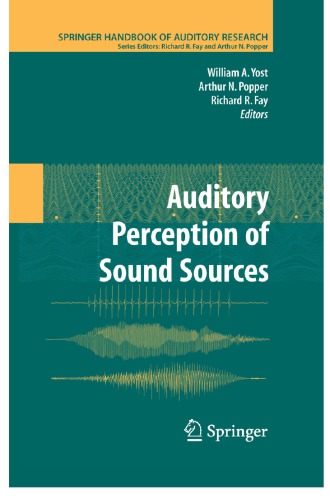

Most ebook files are in PDF format, so you can easily read them using various software such as Foxit Reader or directly on the Google Chrome browser.
Some ebook files are released by publishers in other formats such as .awz, .mobi, .epub, .fb2, etc. You may need to install specific software to read these formats on mobile/PC, such as Calibre.
Please read the tutorial at this link: https://ebookbell.com/faq
We offer FREE conversion to the popular formats you request; however, this may take some time. Therefore, right after payment, please email us, and we will try to provide the service as quickly as possible.
For some exceptional file formats or broken links (if any), please refrain from opening any disputes. Instead, email us first, and we will try to assist within a maximum of 6 hours.
EbookBell Team

5.0
40 reviews
ISBN 10: 0387713042
ISBN 13: 9780387713045
Author: William A. Yost; Richard R. Fay; Arthur N. Popper
The Springer Handbook of Auditory Research presents a series of comprehensive and synthetic reviews of the fundamental topics in modern auditory research. The volumes are aimed at all individuals with interests in hearing research, including advanced graduate students, postdoctoral researchers, and clinical investigators. The volumes are intended to introduce new investigators to important aspects of hearing science and to help established investigators to better understand the fundamental theories and data in fields of hearing that they may not normally follow closely. Each volume presents a particular topic comprehensively, and each serves as a synthetic overview and guide to the literature. As such, the chapters present neither exhaustive data reviews nor original research that has not yet appeared in peer-reviewed journals. The volumes focus on topics that have developed solid data and a strong conceptual foundation rather than on those for which a literature is only beginning to develop. New research areas will be covered on a timely basis in the series as they begin to mature.
Chapter 1: Perceiving Sound Sources
Chapter 2: Human Sound Source Identification
Chapter 3: Size Information in the Production and Perception of Communication Sounds
Chapter 4: The Role of Memory in Auditory Perception
Chapter 5: Auditory Attention and Filters
Chapter 6: Informational Masking
Chapter 7: Effects of Harmonicity and Regularity on the Perception of Sound Sources
Chapter 8: Spatial Hearing and Perceiving Sources
Chapter 9: Envelope Processing and Sound-Source Perception
Chapter 10: Speech as a Sound Source
Chapter 11: Sound Source Perception and Stream Segregation in Nonhuman Vertebrate Animals
auditory sources
sound perception examples
auditory sounds examples
auditory perception changes with the rate of speech
a sound is often detected by one ear
Tags: William Yost, Richard Fay, Arthur Popper, Perception